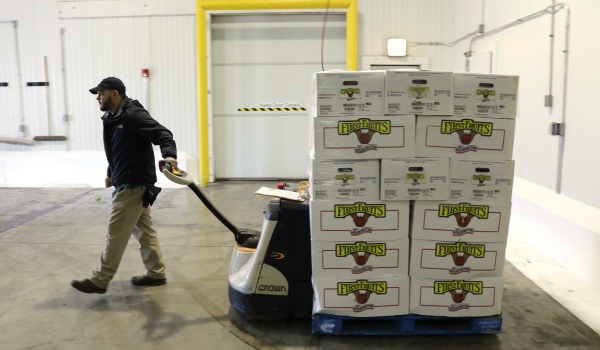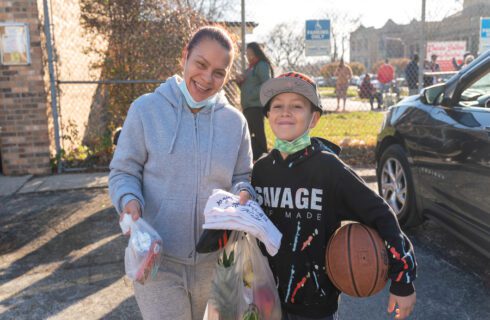
A delivery of fresh apples arrives at the Food Depository. Among our core food items, fresh produce is a high priority because of its importance to a balanced diet.
Our Core Items
Fresh produce Canned fruit Canned vegetables Canned fish Soup Stew Beans Bread Cereal Eggs Jelly Macaroni & cheese Meat Milk Pasta Pasta sauce Peanut butter Rice
“The list is based on staples for a balanced diet,” Herman says. “We have to be the advocate for our agencies,” helping the network of more than 700 pantries, programs, soup kitchens and shelters provide a balanced and varied selection of food for the people they serve. Consistently providing a variety of healthy options for agencies to choose from is the biggest challenge, Herman says. Over the past several years, the Food Depository has placed an increasing priority on fresh produce, which provides crucial health benefits. During the growing season, from April to October, donations of fresh produce arrive consistently. At times, surpluses or shortages in the harvest affect availability and require the Food Depository to purchase more. Herman and the rest of the Food Resources staff work to ensure that agencies can offer both shelf-stable and fresh fruits and vegetables. When purchasing items, the Food Depository seeks out options that are lower in sugar, sodium, and fat. Many people who struggle with hunger also have chronic medical conditions that require a special diet. 60% of households we serve include someone with high blood pressure, and 35% include someone with diabetes. To keep these chronic conditions under control, it’s essential to provide access to healthy food options. Trends in the food industry have affected the Food Depository’s supplies in recent years. As food companies become more efficient, opportunities to receive donated surplus aren’t as consistent as they once were. While donated food still makes up much of our supply, the Food Depository also purchases in bulk to ensure that all the core items are consistently available. Food drives are a helpful source of food items that are costly to purchase, such as canned fish and canned fruit. Some of the surprising items that are not donated frequently include baby food, dry cereal, and canned entrees, such as soups and stews. Older adults frequently prefer items with easy-to-open cans: packaging is an additional consideration as we distribute food. Volunteers assist with processing food drive donations in our warehouse. The Greater Chicago Food Depository is one of the only food banks with an electronic scanning system. After staff inspect each can or box of food for its expiration date, volunteers check for damage and scan each item’s bar code. If an item has been recalled, the computer displays a warning, and all of the recalled items are removed. The scanning system is just one element of a comprehensive food safety strategy. The Food Depository constantly examines practices to improve food storage and extend shelf life. In one recent adjustment, the Food Depository began freezing bread to maintain its freshness for longer. Every can, dollar, and pound of food donated help us provide a balanced variety of items to our partner agencies and the people they serve. Food drives, financial gifts and volunteer hours ensure that nutritious, high-quality options are available to the 1 in 6 residents of Cook County who turn to our network for assistance.Share This Post



